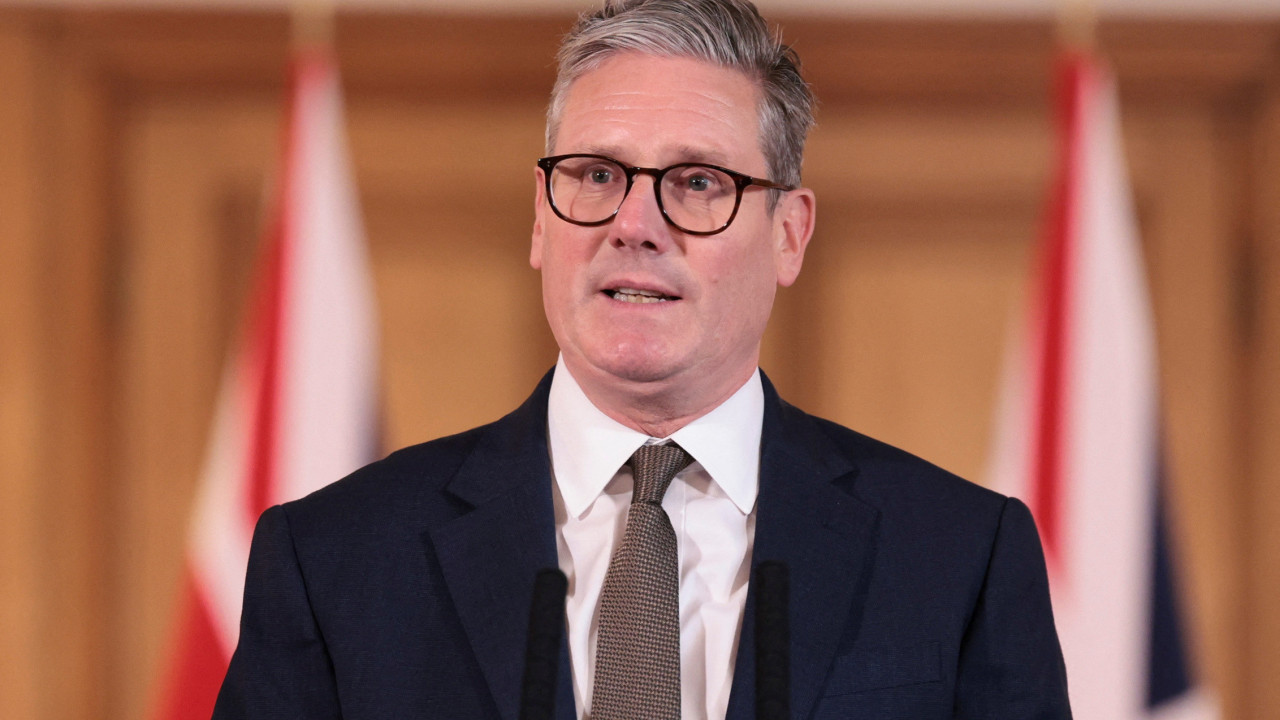
NIn a statement delivered this afternoon at 10 Downing Street, the Prime Minister promised that “everything necessary will be done to bring these criminals to justice”, as he addressed the nation on the ongoing violence in several parts of the country.
According to the AP, police in the northern English town of Rotherham struggled to contain a crowd of far-right protesters who were trying to storm a hotel housing asylum seekers.
Before controlling the riot, police armed with shields faced a barrage of objects thrown at them, including pieces of wood, chairs and fire extinguishers, as they tried to stop the protesters, many of whom were wearing masks, from entering the Holiday Inn Express.
A small fire in a garbage container was also visible, while hotel windows were broken.
A wave of unrest has hit the UK following a stabbing attack at a dance class last week in northern England that left three children dead and several others injured.
In other parts of the country the atmosphere is also particularly tense, such as in the city of Middlesborough, in the northeast of the country, where a group of protesters walked through a residential area breaking windows of houses and cars.
When a resident asked him why they were breaking windows, a man replied: “Because we are English.”
Far-right protesters clashed with anti-racism activists across the UK on Saturday, with violent scenes taking place in places from Belfast, the capital of Northern Ireland, to Liverpool in northwest England and Bristol in the west.
Police have made about 100 arrests, but more are likely as officers review footage from security cameras and bodycams, as well as social media posts.
The violence that has gripped the country in recent days erupted following Monday’s attack in Southport, which resulted in the arrest of a 17-year-old.
False rumors that the suspect was Muslim and an immigrant spread online, fueling anger among far-right supporters.
Suspects under the age of 18 are not normally identified in the UK, but Judge Andrew Menary ordered that Axel Rudakubana, who was born in Wales to Rwandan parents, be identified, in part to prevent the spread of misinformation.
Rudakubana was charged with three counts of murder and 10 counts of attempted murder.
Police said many of the weekend’s actions were organised online by shadowy far-right groups, rallying support with slogans such as “enough is enough”, “save our children” and “stop the boats”, capitalising on concerns about the scale of immigration into the country, particularly the tens of thousands of migrants arriving in small boats across the English Channel from France.
Nigel Farage, who was elected to parliament in July for the first time as leader of Reform UK, has also been accused by many of indirectly encouraging the anti-immigration sentiment that has been evident in recent days.
While condemning the violence, he criticized the government for blaming “a few far-right thugs” and for saying that “the far right is a reaction to fear.” […] shared by tens of millions of people.”
New UK Prime Minister Keir Starmer blamed the violence on “far-right hatred” and vowed to end the chaos.
Home Secretary Diana Johnson told the BBC there was “no need” to call in the army to help police in their efforts to tackle violence.
Researchers into disinformation phenomena in the United Kingdom, interviewed by newspapers such as The Guardian and The Independent this weekend, attribute the resurgence of far-right violence to the decision to allow their leaders to return to social media, with disinformation maneuvers.
University of Bristol professor Stephan Lewandowski and Jacob Davey, director of the policy department at the Institute for Strategic Dialogue (ISD), agree that social networks such as X and Facebook are fueling the growth of extremism by giving their “figureheads” access to a platform to manipulate violence in their favor, through lies.
For these researchers, the situation is aggravated by the multiplicity of “unknown and unreliable sources”, which have taken the traditional place of an immediately identifiable political structure or even movement.
Jacob Davey, speaking to The Guardian, called for “much greater cooperation between government departments” as well as “links between local authorities and the police”.
“We have seen an extreme right that has been emboldened” by the lack of such cooperation, the ISD researcher said, recalling recent attacks on migrant centers in Kirby and Dover. “This did not come out of nowhere,” he said, referring to the violence of recent days.
Read Also: Clashes between police and anti-immigration protesters in the UK
Download our free App.
Eighth consecutive year Consumer Choice for Online Press and elected product of the year 2024.
* Study by Netsonda, Nov. and Dec. 2023 productoftheyear- pt.com
Source: https://www.noticiasaominuto.com/mundo/2610087/bandidagem-de-extrema-direita-starmer-condena-ataque-a-hotel



